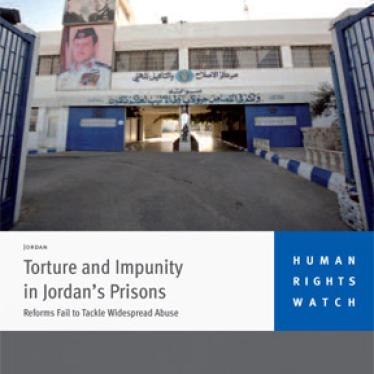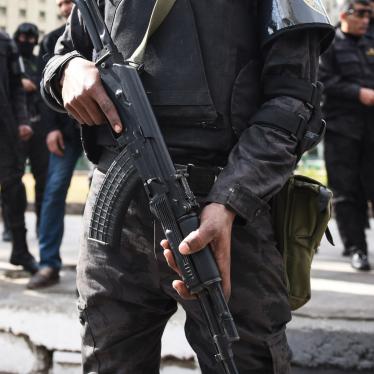(Berlin) - Jordan should take steps to prevent torture in light of recent allegations of severe abuse there, Human Rights Watch said today. European and Arab national human rights institutions are discussing the subject on May 11, 2011, in Berlin, with the German Institute for Human Rights and the Jordanian National Center for Human Rights opening the discussion.
Following the arrests of over 100 Islamists at a demonstration that turned violent in Zarqa, Jordan, on April 15, Human Rights Watch received credible allegations of severe beatings of Islamists in custody by security forces.
"If Jordan is serious about preventing torture, it should vigorously investigate allegations of abuse," said Christoph Wilcke, senior Middle East researcher for Human Rights Watch. "For all its promise of change, Jordan's laudable reform efforts have fallen short of the mark and remained ineffective in combating torture."
One of the Islamists detained in the Zarqa incident described being taken with others to a security station in Rusaifa, a short distance away, where he said officers who described themselves as belonging to "Team 62" and "Team 71" beat him and other detainees on the head, back, and other body parts for about three hours while their hands and feet were shackled. This person, who asked to remain anonymous, was among a large group released on May 5 after an initial investigation. He has back pain as a result of his treatment in detention, preventing him from working, he said.
In an October 2008 report, "Torture and Impunity in Jordan's Prisons," Human Rights Watch found torture to be widespread and routine with near-total impunity for the perpetrators. Since then, Jordan has undertaken some reform efforts, but has eschewed institutional change. Reforms have included:
- Amending the penal code to include the crime of torture under article 208;
- Placing police prosecutors inside prisons to receive and follow up on complaints;
- Conducting training for prison personnel on torture prevention;
- Agreement by the Public Security Directorate, which runs prisons and is responsible for most other places of detention, to allow the National Center for Human Rights to form a group of 25 voluntary civil society activists to act as an independent inspection team for prisons; and
- Revising the composition of the three-judge police court responsible for trying suspects for assault or torture to include one civilian judge; the others are police officers.
The following are critical institutional reforms that Jordanian officials have yet to make:
- Including a definition of ill-treatment under article 208 of the penal code, in conformity with international law;
- Transferring jurisdiction over complaints of ill-treatment or torture to a civilian court from police court. Police prosecutors and police judges appointed by the police chief currently prosecute and try colleagues accused of torture or other crimes. Prosecutions have been infrequent, and mostly for minor crimes such as beating, and sentences have been lenient;
- Moving management of prisons from the Interior Ministry's Public Security Directorate to the Justice Ministry;
- Conducting medical checks on detainees upon their arrival in prison, since most torture now occurs in police stations, not prisons;
- Independently and vigorously investigating ill-treatment and torture complaints. To date, no case for torture under article 208 has been brought to court;
- Creating confidential complaint mechanisms for inmates;
- Granting the National Center for Human Rights permission for unannounced visits to the detention center of the General Intelligence Department; and
- Acceding to the Optional Protocol of the United Nations Convention against Torture.
"It is high time Jordan embarked on the institutional reforms necessary to combat torture," Wilcke said.







